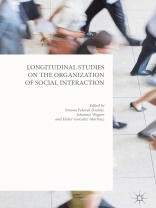This book advances our understanding of change over time in human social conduct, and represents the first consolidated effort to reveal how micro-analytic studies of social interaction address such issues. The book presents a collection of longitudinal studies drawing on conversation analysis across a variety of settings, practices, languages and timescales, and analyses the ways in which participants produce and deal with practices changing over time. This edited collection will interest students and scholars of conversation analysis, sociolinguistics, discourse analysis, interactional linguistics and pragmatics.
Tabla de materias
Chapter 1. Longitudinal research on the organization of social interaction: current developments and methodological challenges; Johannes Wagner, Simona Pekarek Doehler and Esther González-Martínez.- Section I. Change in interactional practices within family settings.- Chapter 2. Making knowing visible: tracking the development of the response token yes in second turn position; Anna Filipi, – Chapter 3. Tracking change over time in storytelling practices: a longitudinal study of second language in-talk interaction; Evelyne Berger and Simona Pekarek Doehler.- Section II. Change in skils and interactional competences in school settings.- Chapter 4. Talking about reading: changing practices for a literacy event; John Hellermann.- Chapter 5. From trouble in the talk to new resources: the interplay of bodily and linguistic resources in the talk of a speaker of English as a second language; Søren W. Eskildsen and Johannes Wagner.- Chapter 6. How the ‘machinery’ of sense-production changesover time; Timothy Koschmann, Robert Sigley and Alan Zemel, Carolyn Maher.- Section III. Change in interactional practices in workplace settings.- Chapter 7. A longitudinal perspective on turn design: from role-plays to workplace patient consultations; Hanh Thi Nguyen.- Chapter 8. Conversation analysis and psychotherapeutic change; Liisa Voutilainen, Federico Rossano and Anssi Peräkylä.- Chapter 9. Discovering interactional authenticity – tracking theatre practitioners across rehearsals; Spencer Hazel.- Section IV. Collective and cultural change.- Chapter 10. Controversial issues in participatory urban planning: an ethnomethodological and conversation analytic historical study; Lorenzo Mondada.- Chapter 11.
When Cancer Calls…: longitudinal analysis and sustained cultural impact; Wayne A. Beach, David M. Dozier and Kyle Gutzmer.
Sobre el autor
Simona Pekarek Doehler is Professor of Applied Linguistics at the University of Neuchâtel, Switzerland. Her research explores the development of interactional competence, based on longitudinal conversation analysis, as well as the role of grammatical resources in the organization of social interaction.
Johannes Wagner is Professor of Communication at the Department of Design and Communication, University of Southern Denmark, Denmark. He is a member of the research unit PIPE. In his contributions to the journal
Applied Linguistics he has pushed for a microsociological understanding of second language learning and teaching. In recent years he has studied human social praxis as the nexus of verbal interaction, embodied practices and tangible objects in the environment.
Esther González-Martínez is Associate Professor of Sociology at the University of Fribourg, Switzerland. Her area of specialisation i
s the analysis of social interactions in institutional settings. Her research combines conversation and multimodal analysis with ethnographic fieldwork.












